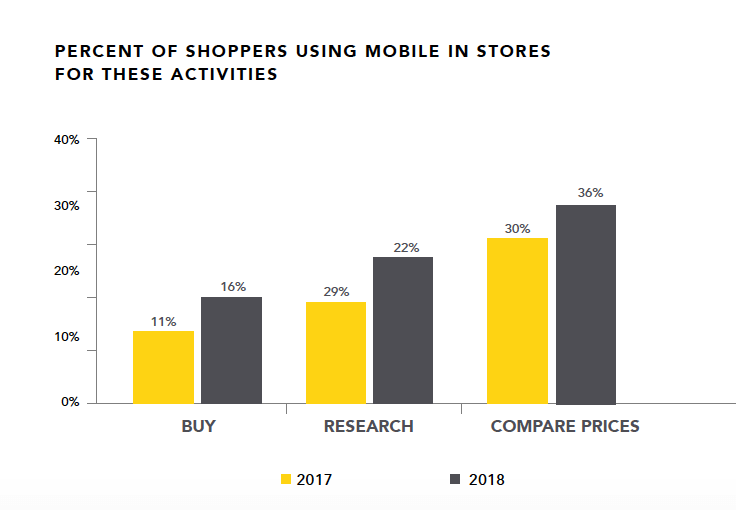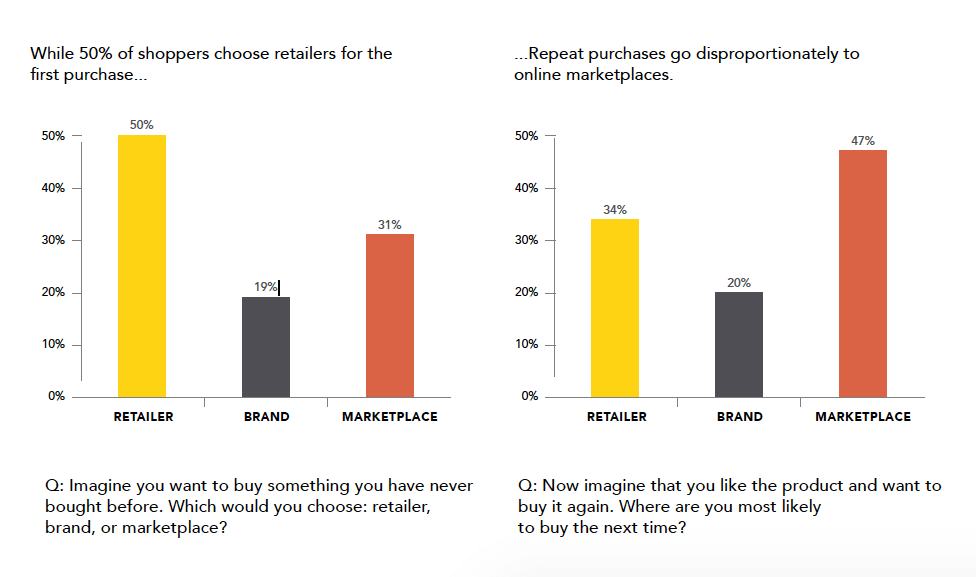Report: Marketers are missing mobile opportunities to reach customers in store
The Salesforce/Publicis.Sapient study reveals that 71% of retail customers use their phone during their in-store shopping experience.
 A new report from Salesforce and Publicis.Sapient shows that marketers are missing opportunities to engage with customers who are pulling out their phones while they’re shopping in store.
A new report from Salesforce and Publicis.Sapient shows that marketers are missing opportunities to engage with customers who are pulling out their phones while they’re shopping in store.
The Shopper-First Retailing Report includes insights gleaned from a huge data set that includes global digital shopping behavior from 500 million shoppers through 1.4 billion ecommerce visits, customer service data from 200 million service cases, a survey of 6,000 consumers and in-person mystery shopping assessments.
The report found that a majority of shoppers (71 percent) use a mobile device in-store to do at least one educational or research activity, a number that is up 15 percent from last year. At the same time, the research showed that shoppers who have responded to personalized promotions or offers in the past are overwhelmingly eager (84 percent) to receive such offers in the future, creating a potentially receptive audience in the store with phones in hand.

We already know that personalization through machine learning and artificial intelligence (AI) drives revenue, but this report shows just how powerful it is, with 6 percent of those types of visits driving 37 percent of revenue. Personalized experiences yielded a 4.5 times higher cart rate and 5 times higher per visit spend than those without.
Good customer service and trustworthiness are important qualities to consumers, with 80 percent saying that the experience is as important as a company’s products and services and a whopping 95 percent saying they’d be more likely to be loyal to a company that they trust.
But despite the promises behind personalization and good customer experience, more than half of the consumers surveyed (64 percent) say that they feel that retailers don’t truly know them.
Leveraging AI and extending the brand’s mobile experience into the store is key for marketers, the report says:
Most retailers understand that intelligence is important. But the opportunities to grow AI-powered efforts are massive, especially given the fact that AI becomes more useful in personalizing content and experiences with every click, tap, or search.
And:
Many retailers don’t put personalized elements front and center in ecommerce, instead relegating recommendations to the bottom of the product detail page, especially on mobile. Additionally, the 70 stores in our in-person study received an average mobile score of 1.74/5. This is a missed opportunity to infuse intelligence in stores, as these mobile elements are often personalized — like push notifications and interactive location maps.
Marketplaces are edging out retailers on second purchases
Another lesson for retail marketers from the study is that customers are increasingly preferring purchasing from an online marketplace like Amazon, particularly for a second purchase.
Nearly half (47 percent) of reorder or repeat purchases are through a marketplace, regardless of where the initial purchase was made. Consumers said they’d buy something for the first time at a retailer half of the time, followed by marketplaces (31 percent) and direct from the brand (19 percent). But when asked where they’d go for a second time, nearly half said they’d go to the marketplace (47 percent) over the retailer (34 percent).

There are signs that marketplaces are starting to get more first-time customers as well. Twenty-eight percent of consumers surveyed said that when they are buying a product for the first time, they prefer to start their search on Amazon. That’s up from 22 percent the previous year.
Marketers should take note of why consumers were opting to visit marketplaces and keep those reasons in mind as they develop strategies to lure their customers back. Marketplace consumers said that they were swayed by price (56 percent), product variety (51 percent), product availability (50 percent) and inspiration (48 percent).
Contributing authors are invited to create content for MarTech and are chosen for their expertise and contribution to the martech community. Our contributors work under the oversight of the editorial staff and contributions are checked for quality and relevance to our readers. The opinions they express are their own.
Related stories
New on MarTech